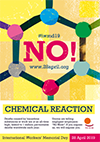Toutes les 11 secondes, une personne meurt en raison des conditions dangereuses dans lesquelles elle travaille. La prise de conscience gagne du terrain, mais le cancer est toujours la première cause de décès dû au travail dans de nombreux pays. Cette année, à l’occasion de la Journée internationale de commémoration des travailleuses et des travailleurs, la CSI appelle à «zéro cancer».
«Nous travaillons pour ‘gagner notre vie’ mais les travailleurs sont toujours exposés à des substances mortelles. Aujourd’hui, nous rendons hommage aux personnes qui ont perdu la vie au travail. En leur mémoire nous continuons à nous battre pour vivre,» a déclaré Sharan Burrow, la secrétaire générale de la CSI.
En dépit de la longue période qui peut se dérouler entre l’exposition à des substances dangereuses et le diagnostic du cancer, la recherche met de plus en plus souvent en évidence le lien existant entre le cancer et ses causes professionnelles. La CSI, en partenariat avec la campagne de la revue «Hazards», a réalisé un guide pratique qui résume les principaux risques de cancers professionnels.
«Grâce aux syndicats, le travail est plus sûr. Les travailleurs sont les mieux placés pour savoir où se trouvent les dangers sur leur lieu de travail et c’est leur connaissance et leur action collective qui permettent d’améliorer durablement la santé et la sécurité. Nous plaidons en faveur de conditions toujours plus sûres, depuis le lieu de travail jusqu’aux normes internationales élaborées par l’Organisation internationale du travail. Il est fondamental de garantir la santé et la sécurité au travail. La Déclaration du centenaire de l’OIT offre une réelle opportunité de réaliser les importantes avancées qui permettraient de sauver des millions de vies. Il ne faut pas la manquer,» a précisé Sharan Burrow.
C’est également ce qu’a annoncé M. Baskut Tuncak, le Rapporteur spécial des Nations Unies sur les droits de l’homme et les produits et déchets dangereux, pour qui la communauté internationale doit «veiller aux opportunités dont nous disposons actuellement pour éliminer les inégalités de traitement existantes entre les pays exploités par des entreprises peu scrupuleuses au travers de leurs chaînes d’approvisionnement.» Puis, s’exprimant sur la nécessité de renforcer la sécurité internationale, il a ajouté: «les instruments mondiaux interdisent ou limitent l’utilisation ou l’émission de moins de 0,1% seulement des substances chimiques industrielles toxiques et des pesticides suscitant une préoccupation mondiale auxquels les travailleurs et les populations locales sont exposés.»
De nouveaux produits chimiques arrivent sans cesse sur les sites de travail, et très peu ont fait l’objet d’un contrôle approfondi pour évaluer leur cancérogénicité. L’amélioration des normes de test est indispensable pour éviter d’autres décès. L’OIT est la principale organisation chargée d’améliorer les normes pour des millions de personnes à travers le monde. La CSI exhorte les employeurs et les gouvernements à se montrer à la hauteur de cette mission et à accepter la nature fondamentale de la santé et de la sécurité organisationnelle lors de la Conférence du centenaire de l’OIT en juin 2019.
Les syndicats de toute la planète se mobilisent aujourd’hui pour rendre hommage aux travailleuses et aux travailleurs et obtenir de meilleures conditions de santé et de sécurité au travail. Consultez les dernières nouvelles sur 28April.org.

















